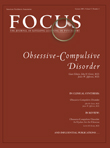The Psychological Treatment of Obsessive-Compulsive Disorder
The psychological treatment of obsessive-compulsive disorder (OCD) with exposure and response prevention (ERP) methods is one of the great success stories within the field of mental health. Within the span of about 20 years, the prognosis for individuals with OCD has changed from poor to very good as a result of the development of ERP. This success not withstanding, the procedures are far from perfect because a substantial minority of patients still either refuse treatment, drop out prematurely, or fail to benefit. I begin this article with a review of the development of ERP from early animal research on avoidance learning conducted during the 1950s. Next, I discuss the mechanisms of ERP. The bulk of the article reviews the treatment-outcome literature on ERP for OCD and includes comparisons with cognitive therapy—the “new kid on the block” with respect to psychological treatments for OCD.
(Reprinted with permission from Canadian Journal of Psychiatry 2006; 51:407–416; full text of article available online at http://ww1.cpa-apc.org:8080/Publications/Archives/CJP/2006/june/cjp-june-06-abramowitz-IR.pdf)



